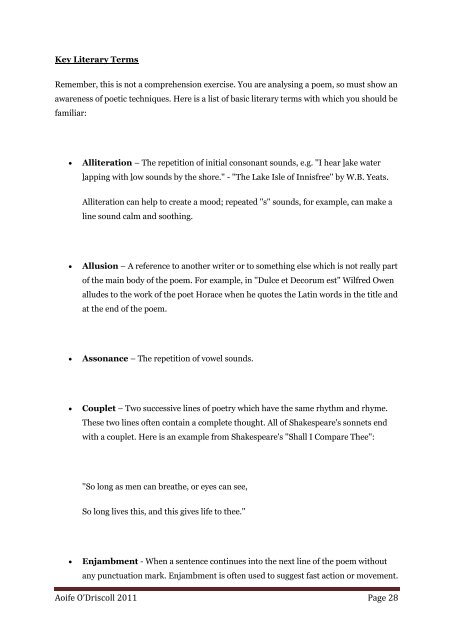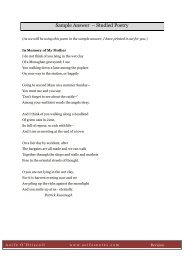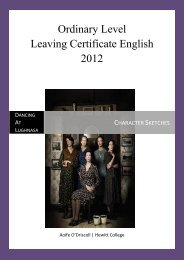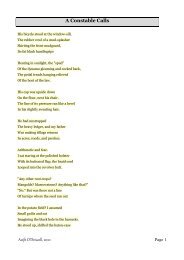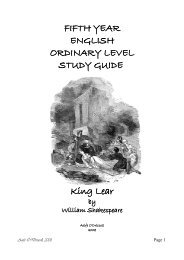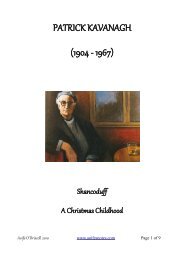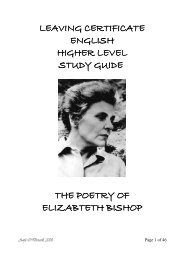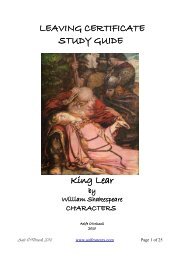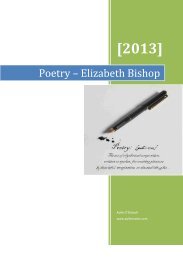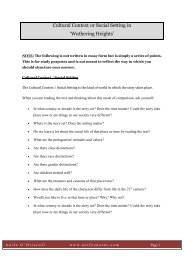Poetry - How to Write the Essay - Focus on Larkin - Aoife's Notes
Poetry - How to Write the Essay - Focus on Larkin - Aoife's Notes
Poetry - How to Write the Essay - Focus on Larkin - Aoife's Notes
You also want an ePaper? Increase the reach of your titles
YUMPU automatically turns print PDFs into web optimized ePapers that Google loves.
Key Literary Terms<br />
Remember, this is not a comprehensi<strong>on</strong> exercise. You are analysing a poem, so must show an<br />
awareness of poetic techniques. Here is a list of basic literary terms with which you should be<br />
familiar:<br />
Alliterati<strong>on</strong> – The repetiti<strong>on</strong> of initial c<strong>on</strong>s<strong>on</strong>ant sounds, e.g. ''I hear lake water<br />
lapping with low sounds by <str<strong>on</strong>g>the</str<strong>on</strong>g> shore.'' - ''The Lake Isle of Innisfree'' by W.B. Yeats.<br />
Alliterati<strong>on</strong> can help <str<strong>on</strong>g>to</str<strong>on</strong>g> create a mood; repeated ''s'' sounds, for example, can make a<br />
line sound calm and soothing.<br />
Allusi<strong>on</strong> – A reference <str<strong>on</strong>g>to</str<strong>on</strong>g> ano<str<strong>on</strong>g>the</str<strong>on</strong>g>r writer or <str<strong>on</strong>g>to</str<strong>on</strong>g> something else which is not really part<br />
of <str<strong>on</strong>g>the</str<strong>on</strong>g> main body of <str<strong>on</strong>g>the</str<strong>on</strong>g> poem. For example, in ''Dulce et Decorum est'' Wilfred Owen<br />
alludes <str<strong>on</strong>g>to</str<strong>on</strong>g> <str<strong>on</strong>g>the</str<strong>on</strong>g> work of <str<strong>on</strong>g>the</str<strong>on</strong>g> poet Horace when he quotes <str<strong>on</strong>g>the</str<strong>on</strong>g> Latin words in <str<strong>on</strong>g>the</str<strong>on</strong>g> title and<br />
at <str<strong>on</strong>g>the</str<strong>on</strong>g> end of <str<strong>on</strong>g>the</str<strong>on</strong>g> poem.<br />
Ass<strong>on</strong>ance – The repetiti<strong>on</strong> of vowel sounds.<br />
Couplet – Two successive lines of poetry which have <str<strong>on</strong>g>the</str<strong>on</strong>g> same rhythm and rhyme.<br />
These two lines often c<strong>on</strong>tain a complete thought. All of Shakespeare's s<strong>on</strong>nets end<br />
with a couplet. Here is an example from Shakespeare's ''Shall I Compare Thee'':<br />
''So l<strong>on</strong>g as men can brea<str<strong>on</strong>g>the</str<strong>on</strong>g>, or eyes can see,<br />
So l<strong>on</strong>g lives this, and this gives life <str<strong>on</strong>g>to</str<strong>on</strong>g> <str<strong>on</strong>g>the</str<strong>on</strong>g>e.''<br />
Enjambment - When a sentence c<strong>on</strong>tinues in<str<strong>on</strong>g>to</str<strong>on</strong>g> <str<strong>on</strong>g>the</str<strong>on</strong>g> next line of <str<strong>on</strong>g>the</str<strong>on</strong>g> poem without<br />
any punctuati<strong>on</strong> mark. Enjambment is often used <str<strong>on</strong>g>to</str<strong>on</strong>g> suggest fast acti<strong>on</strong> or movement.<br />
Aoife O’Driscoll 2011 Page 28


